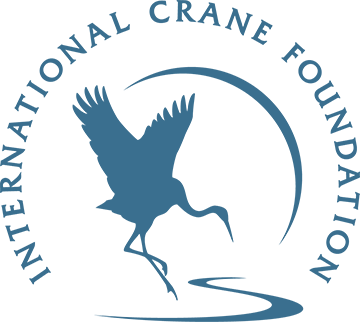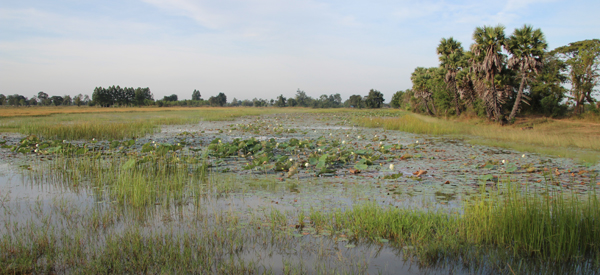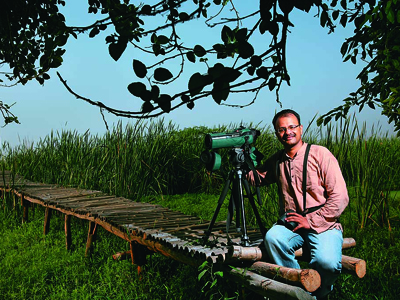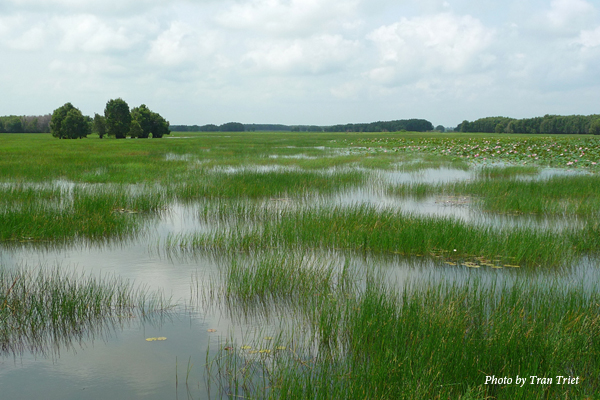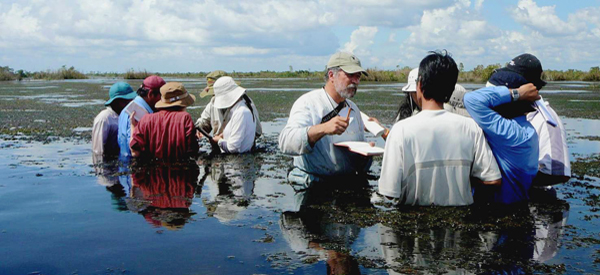 Mid-morning, November 25, Thai colleagues and I are observing a pair of yearling Eastern Sarus Cranes digging and swallowing large sedge tubers from a harvested rice paddy near the Jorakae Non-hunting Area. To farmers, the sedges are weeds and thus killed by herbicides. So perhaps the cranes are, in a small way, helping the farmers. Suddenly an elderly man appeared riding a bicycle along the dirt road. His name was Mr. Nhu Pogang, and he has been a resident of this area for all of his 83 years. In his youth, the region was mostly forested with open wetlands in low-lying areas and cranes were common.
Mid-morning, November 25, Thai colleagues and I are observing a pair of yearling Eastern Sarus Cranes digging and swallowing large sedge tubers from a harvested rice paddy near the Jorakae Non-hunting Area. To farmers, the sedges are weeds and thus killed by herbicides. So perhaps the cranes are, in a small way, helping the farmers. Suddenly an elderly man appeared riding a bicycle along the dirt road. His name was Mr. Nhu Pogang, and he has been a resident of this area for all of his 83 years. In his youth, the region was mostly forested with open wetlands in low-lying areas and cranes were common.
Tag: Sarus Crane
ICF's K.S. Gopi Sundar Makes Top 25 Smartest Indians List
 Outlook India, among the five most read English national magazines in India, has featured 25 smartest Indians from various backgrounds and professions as their cover story this week. Included on the list is K.S. Gopi Sundar, International Crane Foundation SarusScape Program Director.
Outlook India, among the five most read English national magazines in India, has featured 25 smartest Indians from various backgrounds and professions as their cover story this week. Included on the list is K.S. Gopi Sundar, International Crane Foundation SarusScape Program Director.
Sarus Crane Wintering Area Wetland of International Importance
 For more than 25 years, ICF has been deeply involved in the establishment and management of what is now Tram Chim National Park, the largest wetland conservation area in the Mekong River Basin of Southeast Asia. Earlier this year, Tram Chim was designated a Wetland of International Importance through the Ramsar Convention, an international treaty for the conservation and wise use of wetlands.
For more than 25 years, ICF has been deeply involved in the establishment and management of what is now Tram Chim National Park, the largest wetland conservation area in the Mekong River Basin of Southeast Asia. Earlier this year, Tram Chim was designated a Wetland of International Importance through the Ramsar Convention, an international treaty for the conservation and wise use of wetlands.
ICF Partners with U.S. State Dept to Study Pollutants in Mekong
 ICF has worked in the Mekong River Basin since 1988, coordinating community projects, long-term wetland restoration activities, and training for a new generation of wetland managers. Working with eight founding institutions, ICF created the University Network of Southeast Asia in 2001 to establish a training program in wetland ecology and management for students and professionals in the Mekong Basin. Over the past ten years, this network has grown to include 18 member universities and has trained over 200 students in wetland management. Many are now leaders in universities and conservation organizations working within the region.
ICF has worked in the Mekong River Basin since 1988, coordinating community projects, long-term wetland restoration activities, and training for a new generation of wetland managers. Working with eight founding institutions, ICF created the University Network of Southeast Asia in 2001 to establish a training program in wetland ecology and management for students and professionals in the Mekong Basin. Over the past ten years, this network has grown to include 18 member universities and has trained over 200 students in wetland management. Many are now leaders in universities and conservation organizations working within the region.
